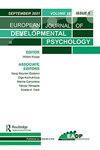儿童欧洲身份认同的强度:来自四个受冲突影响地区多数和少数群体的调查结果
IF 1.9
4区 心理学
Q3 PSYCHOLOGY, DEVELOPMENTAL
European Journal of Developmental Psychology
Pub Date : 2023-04-18
DOI:10.1080/17405629.2023.2200930
引用次数: 3
摘要
欧盟旨在促进和平。本研究调查了欧洲四个受冲突影响的社会(克罗地亚、科索沃、北爱尔兰和北马其顿共和国)中多数群体和少数群体儿童的欧洲身份的显著性。这些网站代表了与欧盟的一系列关系(例如,离开欧盟,成为欧盟成员,想要加入欧盟)。参与者包括442名7至11岁的儿童,按性别和群体地位平均分配(克罗地亚n = 90;科索沃n = 107;NI n = 60;RNM n = 185)。在绘制和讲述启动欧洲身份的任务(与内群体或控制条件相比)之后,我们测量了儿童对欧洲的认同,外群体态度和亲社会性。虽然欧洲认同启动效应不有效,但儿童的欧洲认同强度因地点和群体地位而异,并与对冲突-竞争外群体的更积极态度和亲社会性有关。讨论了欧洲一体化对未来的影响。本文章由计算机程序翻译,如有差异,请以英文原文为准。
Strength of children’s European identity: findings from majority and minority groups in four conflict-affected sites
ABSTRACT The European Union (EU) aims to promote peace. This research investigates the saliency of a European identity for children from majority and minority groups in four conflict-affected societies in Europe (Croatia, Kosovo, Northern Ireland (NI), and Republic of North Macedonia (RNM)). These sites represent a range of relations with the EU (e.g., leaving the EU, an EU member, wanting to join the EU). Participants included 442 children aged 7 to 11 years, evenly split by gender and group status (Croatia n = 90; Kosovo n = 107; NI n = 60; RNM n = 185). After a draw-and-tell task to prime European identity (vs. ingroup or control condition), we measured children’s identification with Europe, outgroup attitudes and prosociality. Although the European identity prime was not effective, children’s strength of European identity varied by site and group status and related to more positive attitudes and prosociality towards the conflict-rival outgroup. Implications for the future of the European project are discussed.
求助全文
通过发布文献求助,成功后即可免费获取论文全文。
去求助
来源期刊

European Journal of Developmental Psychology
PSYCHOLOGY, DEVELOPMENTAL-
CiteScore
3.70
自引率
0.00%
发文量
35
 求助内容:
求助内容: 应助结果提醒方式:
应助结果提醒方式:


